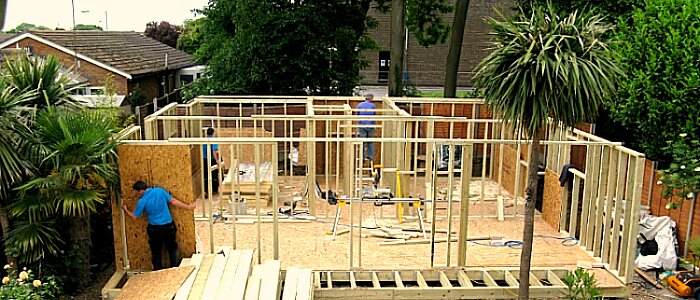3rd August 2011

What makes your company / garden rooms unique?
At in.it.studios we are unique in that we have experience in both manufacturing and architectural design through our two companies (in.it.studios + Bark Joinery). Working in parallel between the two has allowed us to create and deliver a unique product that is at the forefront of contemporary garden building design.
Unlike our competitors, at in.it.studios we have an experienced team of designers working alongside skilled craftsmen and joiners who manufacture all the components for our builds in-house including bi-folding doors, windows and even bespoke furniture. The prefabrication is carried out in our factory in Leicestershire, UK and delivered and constructed to a site anywhere in Europe. Our average build time is typically between 2-4 weeks depending on the size of the project.
As a design conscious company, we are very proud of the aesthetic appearance of our garden rooms. Our team comprises of architects, designers and experts in construction who work symbiotically from the workshop through to completion - to create and build your perfect garden room.
One of the design features we are extremely proud of is our unique cantilevered roof design which incorporates an overhanging porch to provide shade and cover, clad in an attractive and highly durable Accoya timber, it also doubles up to house the bi-folding doors when open.
When Designing your garden rooms, which is more important form or function?
As the Architect Louis Sullivan and father of modernism said, “Form follows Function” and this transpires towards our thinking to. We feel our buildings are functional at heart with the form taking shape over its use.
What scope do you have for incorporating the customers design ideas into your garden rooms?
All our studios are different in their function as we strive to deliver a Garden Room to meet our exact clients needs and requirements. To date, we have not produced two identical studios, demonstrating the fully bespoke service we offer.
Our expert designers work closely with clients requirements to produce a fully flexible and tailor-made studio. For example, extras such as shelving, wardrobes, WC’s, Kitchenettes, and extended outdoor decking + landscaping have all been incorporated regularly in previous builds.
Many customers are concerned about planning permission, how can you help customers with this issue?
All our builds meet the latest building regulations for dwellings, and if you’re looking for a stand alone studio, it is likely that you won’t require planning permission.
In the case it is required, in.it.studios are happy to offer our professional advice, take the necessary measurements and drawings and undertake the whole application process for you with your local council. Thus ensuring the build is planned and constructed in the most hassle-free and professional manner.
Not every site is level, what options do you have for building your garden rooms on uneven ground?
In.it.studios can build a studio on almost any slope. The typical foundations used throughout our studios are built upon revolutionary new concrete plinths. It has many benefits including its flexible application for uneven ground and portability; however it is most acclaimed for its sustainability, typically using 95% less concrete than a conventional slab.
Some customers are concerned about the ongoing maintenance of a garden room, what annual maintenance do your garden rooms require?
For durability and longevity, there is next to no maintenance required.
What aftercare do you offer your customers?
Our studios come with a 5 year guarantee, with an additional 10 years for the roof. Should your studio require any attention during this period our team will come to site and rectify any issues you may have.
Describe your company in three words!
Architects… Designers… Manufacturers…
2nd August 2011

There is an on-going discussion within the construction industry between traditional brick + block houses and Timber-Frame Houses and which style is more advantageous. Here we aim to summarise the key advantages of timber-frame builds.
So, Why Timber-Frame?
- Timber-Frame buildings have been around for hudreds of years, and in certain parts of the world they have become the norm, with an estimated 70% of the world’s population from developed countries being housed in them. In U.S.A and Canada it has been reported that timber-frame housing accounts for as high as 90% of the housing.[1]
- In the UK these figures are lower than the worldwide averages - 24.4% (average of 17% in England) however, it is currently the fastest growing method of construction in the UK.[1] Whether it is a garden building, commercial project, extension or home here we outline the main reasons behind this:
- Timber is one of the most sustainable and green building components available worldwide. The energy to produce materials such as steel or concrete is immense in comparison to that of timber. It is the only truly renewable building resource, and at in.it.studios, all our timber is sourced from sustainable and accredited schemes such as PEFC and FSC.
- Timber-frame buildings have a higher suitability to colder climates, such as the UK’s. They are more energy-efficient than other construction materials providing a comfortable temperature year-round and saving money on further insulation and heating costs.
- One of the main reasons for the vast difference between North American and British percentages shown above is mainly down to the availability of local resources and how this dictates the local building construction (vernacular architecture). In the UK, more readily available building materials such as brick, stone, granite and clay have been the choice of construction down to varying factors such as cost and accessibility. North America has had more access to available forestry and therefore seen a different type of architectural style develop over the years. However, things are changing and as the world has become a smaller place due to cost effective international shipping, the abundance of materials available is now staggeringly larger. As such, in conjunction with progression in technology, a better understanding, development in protective membranes, wood preservatives and treatments as well as a host of other advances have helped re-emerge timber-frame buildings back into the UK market.
- On average timber-frame builds take 20% less construction time[1], than their brick counterparts, saving on labouring costs and causing less disruption to the local area.
- A timber-frame build, like an in.it.studio can be weather-tight in as little as 4 days.
- Contrary to popular belief, Timber performs well in Fire tests and unlike other forms of construction i.e. steel, does not bend or flake at high temperatures.
- Finally... They look great!
Here are some quotes from the media:
“The audience is always biggest when we have a timber building” says the presenter, Kevin McCloud (Grand Designs)
“Timber frame construction is contributing to the drive to provide people with good, modern homes of proven sustainability and efficient construction. It also serves my Government’s aims of reducing CO2 emissions.” Rt Hon Nick Raynsford MP Minister
For information on contemporary sustainable timber-frame builds which can be used for a variety of purposes ranging from (guest) homes, extensions,
garden rooms and commercial properties
click here
[1] Facts and Figures from UKTFA.
1st August 2011
.jpg.aspx)
This is an example of a
games room we are
designing for a client. The studio will be situated at the back of the garden and will feature a pool table as its centre piece with a seating area encompassing a drinks bar towards the right as we look at it.
The client initially approached in.it.studios because he required a
bespoke relaxation come
get-a-way spot from the main house whilst still enjoying the
comforts and
benefits of a normal in–house room.
All our studios come highly
insulated and fully watertight whilst providing electrical
services such as lighting, heating, and power points. Other services such as
internet connections, telephone lines and
TV points can be installed on request.
We ensure that your studio is safe with solid locking mechanisms for the doors and an alarm system for maximum security. We install motion-sensing PIR detectors connected to exterior lights as standard, not only for security, but for convenience allowing users to see where they are stepping when it’s dark.
29th July 2011
In.it.studios is the main feature on Episode 3 of ‘My Flat Pack Home’ called ‘The Leightons’.
The show will be broadcasted again for those that missed it on at
1:00pm on
Sunday 31st July 2011
My Flat-Pack Home
Vicky and Nick Leighton build an office studio come guest house in their garden. The studio was designed, manufactured and installed by in.it.studios complete with a bathroom and a kitchenette. Presenter Amanda Lamb will be accompanying the couple from start to finish, following them through selection and design, building and installation and of course the final tour once the studio is complete and in situ.
Here’s the teaser video, enjoy!
Here’s what the Leightons had to say about their
garden room:
‘The studio is looking fantastic and we are both extremely pleased with the end result and the excellent support and service that we have received from in.it.studios – if only the build of the house had been this easy!”
Nick & Vicky Leighton.
For more information visit the My Flat Pack Home (UKTV) website
28th July 2011
“Forget home improvements - the latest obsession for British homeowners is garden improvements, according to new research from Santander Insurance, which reveals that Britons have collectively spent £5.2 billion sprucing up their gardens in the past year.
The study shows that the average Briton with outside space has spent £1,280 improving their garden area in the past year and estimates that these improvements have added an average of nearly £3,300 to the value of their home as a result.
The research by Santander Insurance reveals that 17 million (39 per cent) Brits have transformed the way they use their
outdoor space in recent years. Of those who have adapted their gardens in the past year, more than a third (35 per cent) have adapted their gardens into a
relaxation area, 11 per cent have made changes to
create extra living space and six per cent have created a
secure parking space.
Financial strain has also impacted the transformation of Britain's gardens with 4.3 million Britons creating vegetable patches in an attempt to save money in the past year alone. This is almost a two-fold increase on the number of Brits looking to re-create ‘the good life' in their back gardens the previous year.
Colin Greenhill, Director of Santander Insurance commented:
“As the property market continues to be challenging, more and more people are choosing to invest in improvements to their current home rather than moving to a new property. Our research shows that Britons are seeking to maximise the value of their entire property by looking beyond interior home improvements and boosting the value of their property by improving the garden area.”
source: www.housefund.co.uk, courtesy of santader insurance.